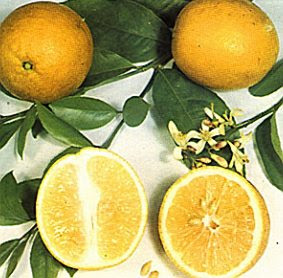Ah, The Meyer Lemon
A friend of ours, a man of many talents and interests, bought a house in the country. A lovely house it is, too. Among many other improvments he made to his house was a most impressive solarium.
One of his many talents and interests is gardening, indoors and out. Well, not just gardening, but plant life in general. A walk in the woods with him is always an adventure since he can identify most of what it is we’re walking on, or walking past, or what lies up ahead.
Our friend has all sorts of plants I’ve never heard of . Or if I have heard of them, I know only the ‘vulgar’ variety. For example, there is syringa vulgaris, the common lilac which dots the landscape of my yard here and there. As anyone who grows them in a humid climate knows, by August the leaves are usually whited over by powdery mildew. The books claim this is due to poor air circulation, but given the various locales in which I’ve seen it, the more likely explanation is that come August your lilac is going to be infected. Period.
However, our friend found a variety that is not prone to mildew so he planted that instead.
There are many varieties of many plants in his solarium. It would take hours to examine them all. However, among his treasures are some lemon trees. Meyer lemon trees to be exact, and they are definitely a cook’s delight.

Our friend gave us one to try. What can I say? A Meyer lemon is to store-boughten lemons as homegrown tomatoes are to the commercial kinds.
For one thing, the rind is usable as zest without bothering to scrape the pith off first. The rind is soft and pliable, making it easy to chop. The pulp is noticeably juicy but not acidic. I think there were a few seeds, but not many.
In sum, that was the best lemon I ever had. I can only imagine the flavor it imparts to lemon curd or lemon pound cake.
For those of you with enough sunlight, the dwarf varieties could be grown inside with a southern exposure and some moisture. Here are some ideas from the grower my friend used to purchase his trees.
And here is an article from The L.A. Times, suggesting one hundred uses for the Meyer Lemon. They don’t say so, but the first thing you do is rub it gently between your hands to release the fragrance…
Lastly, a succinct list of Meyer lemon facts, the first of which is that the Meyer Lemon is not really a true lemon at all:
The Meyer Lemon is not actually a real lemon but a cross between a lemon, a type of orange and a mandarin. While it retains most of the characteristics of a lemon, it has a bit less acidity, less bitterness, more sweetness and thinner skin. The skin of the Meyer Lemon lacks the typical zest of a real lemon. It has gained favor because it bears a heavy crop and it is a relatively hardy plant.Ignore the part about the zest. I used every molecule of that lemon I got and the zestiness of the skin was just fine. In fact, it's an advantage because you don't have to scrape the pith, which in itself has lots of bioflavanoids.




